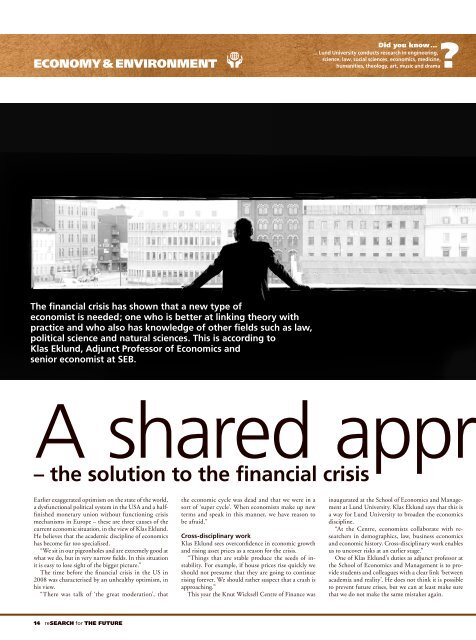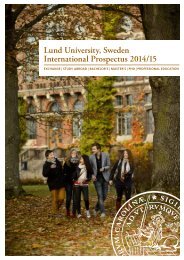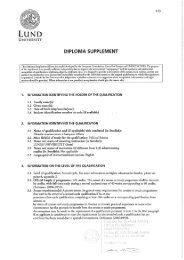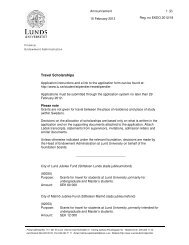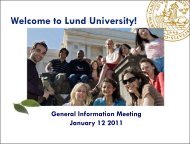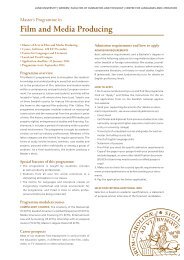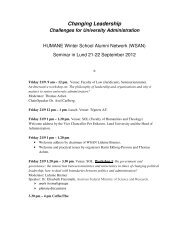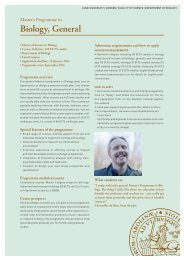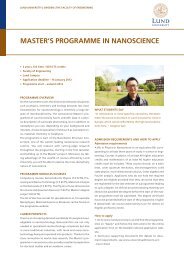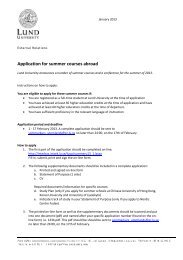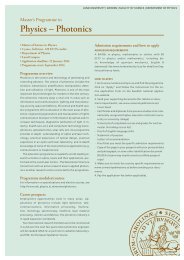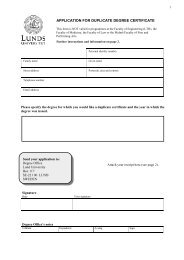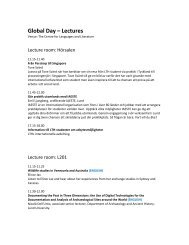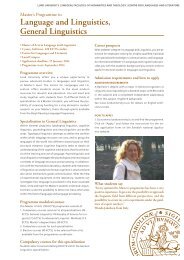A shared appro– <strong>the</strong> solution to <strong>the</strong> financial crisisEconomy & EnvironmentDid you know ...?... <strong>Lund</strong> <strong>University</strong> conducts research in engineering,science, law, social sciences, economics, medicine,humanities, <strong>the</strong>ology, art, music and dramaThe financial crisis has shown that a new type ofeconomist is needed; one who is better at linking <strong>the</strong>ory withpractice and who also has knowledge of o<strong>the</strong>r fields such as law,political science and natural sciences. This is according toKlas Eklund, Adjunct Professor of Economics andsenior economist at SEB.Earlier exaggerated optimism on <strong>the</strong> state of <strong>the</strong> world,a dysfunctional political system in <strong>the</strong> USA and a halffinishedmonetary union without functioning crisismechanisms in Europe – <strong>the</strong>se are three causes of <strong>the</strong>current economic situation, in <strong>the</strong> view of Klas Eklund.He believes that <strong>the</strong> academic discipline of economicshas become far too specialised.“We sit in our pigeonholes and are extremely good atwhat we do, but in very narrow fields. In this situationit is easy to lose sight of <strong>the</strong> bigger picture.”The time be<strong>for</strong>e <strong>the</strong> financial crisis in <strong>the</strong> US in2008 was characterised by an unhealthy optimism, inhis view.“There was talk of ‘<strong>the</strong> great moderation’, that<strong>the</strong> economic cycle was dead and that we were in asort of ‘super cycle’. When economists make up newterms and speak in this manner, we have reason tobe afraid.”Cross-disciplinary workKlas Eklund sees overconfidence in economic growthand rising asset prices as a reason <strong>for</strong> <strong>the</strong> crisis.“Things that are stable produce <strong>the</strong> seeds of instability.For example, if house prices rise quickly weshould not presume that <strong>the</strong>y are going to continuerising <strong>for</strong>ever. We should ra<strong>the</strong>r suspect that a crash isapproaching.”This year <strong>the</strong> Knut Wicksell Centre of Finance wasinaugurated at <strong>the</strong> School of Economics and Managementat <strong>Lund</strong> <strong>University</strong>. Klas Eklund says that this isa way <strong>for</strong> <strong>Lund</strong> <strong>University</strong> to broaden <strong>the</strong> economicsdiscipline.“At <strong>the</strong> Centre, economists collaborate with researchersin demographics, law, business economicsand economic history. Cross-disciplinary work enablesus to uncover risks at an earlier stage.”One of Klas Eklund’s duties as adjunct professor at<strong>the</strong> School of Economics and Management is to providestudents and colleagues with a clear link ‘betweenacademia and reality’. He does not think it is possibleto prevent future crises, but we can at least make surethat we do not make <strong>the</strong> same mistakes again.14 reSEARCH <strong>for</strong> THE FUTURE
Did you know ...?... <strong>Lund</strong> <strong>University</strong> Commissioned Education makes <strong>the</strong> resources ofSweden’s strongest university available to companies, organisations andauthorities aiming to develop <strong>the</strong>ir business and staff? www.education.lu.seNew <strong>the</strong>sisstudies conditions<strong>for</strong> bank aid in EUBecause of <strong>the</strong> major importance ofbanks <strong>for</strong> <strong>the</strong> financial system, <strong>the</strong>EU’s application of <strong>the</strong> rules on stateaid has become more flexible. Butshould all banks that are in difficultyreceive support? Catrin Karlsson from<strong>Lund</strong> <strong>University</strong> School of Economicsand Management has studied thisquestion in her <strong>the</strong>sis in business law.The results entail both good and badnews <strong>for</strong> <strong>the</strong> banks.In her <strong>the</strong>sis, State aid to <strong>the</strong> banking sector,Catrin Karlsson argues <strong>for</strong> stricter applicationof state aid <strong>for</strong> <strong>the</strong> banking sector. Since <strong>the</strong>results could be significant <strong>for</strong> <strong>the</strong> EU’s imminentre<strong>for</strong>m of <strong>the</strong> rules on banking aid,<strong>the</strong> <strong>the</strong>sis entails both good and bad news <strong>for</strong><strong>the</strong> banking sector.“Banks that are fundamentally healthy andefficient could find that a strict application of<strong>the</strong> rules has positive consequences because itcould lead to <strong>the</strong> limiting of aid to inefficientbanks whose problems stem from <strong>the</strong>ir businessmodel or business methods”, says CatrinKarlsson.ach“At <strong>the</strong> moment we are discussing whe<strong>the</strong>r <strong>the</strong> deregulationwent too far and what <strong>the</strong> future will be like.It is important in this context not to lose all faith in<strong>the</strong> markets, but ra<strong>the</strong>r to ensure that <strong>the</strong> markets workbetter in <strong>the</strong> future.”Green capitalism aheadProfessor Eklund also wants to open <strong>the</strong> door to science,which he believes has to lot to teach economists in termsof understanding <strong>the</strong> earth’s resources. Klas Eklundwants to see a transition to ‘green capitalism’, where <strong>the</strong>price mechanisms and markets can be used to steer developmentsin <strong>the</strong> right direction. He does not think<strong>the</strong> discussion should be about whe<strong>the</strong>r we are to havehigh or low growth, but ra<strong>the</strong>r about <strong>the</strong> ‘right’ growth.He also believes that economists need to improve<strong>the</strong>ir understanding of how people think and justify<strong>the</strong>ir decisions.“The field of experimental economics is showingexplosive growth at <strong>the</strong> moment. Researchers look athow people act in different choice situations – whatmotivates our decisions in reality and not just in <strong>the</strong>ory.”Klas Eklund does not rule out <strong>the</strong> possibility that <strong>the</strong>current crisis will continue.“There is a risk that we may see a long period of repercussions.In <strong>the</strong> US, <strong>the</strong> labour market is stagnatingand households are being cautious. In Europe it willtake many years to sort out <strong>the</strong> Euro crisis.” ●Stricter conditions appliedAgainst its own guidelines, <strong>the</strong> EuropeanCommission currently approves all aid tobanks that are in difficulty, regardless of marketconditions. The <strong>the</strong>sis presents a numberof conditions that must be fulfilled in order<strong>for</strong> aid to banks to be approved according to<strong>the</strong> EU’s state aid rules. The conditions arebased on <strong>the</strong> Commission’s own guidelines.“Cases that are alike should be treated alike,and cases that are different should be treateddifferently. If stricter conditions were applied,we could limit <strong>the</strong> distortion of competitionbetween banks in <strong>the</strong> EU”, says Catrin Karlsson.The results show that decisions on whoshould receive aid should be based on <strong>the</strong>state of <strong>the</strong> market and <strong>the</strong> bank, as well ason <strong>the</strong> design and necessity of <strong>the</strong> measures.“In normal market conditions, <strong>the</strong> opportunities<strong>for</strong> banks to receive aid should generallybe limited”, says Catrin Karlsson, adding:“During a system crisis, it should be moredifficult <strong>for</strong> a small bank with low risk exposureto receive aid. An exception could bemade when <strong>the</strong> bank is important <strong>for</strong> loans to<strong>the</strong> regional real economy. In <strong>the</strong> same way,support to large banks that are suffering as aresult of inefficient working models with excessiverisk taking should be limited.”To support her study, Catrin Karlsson hasstudied legal sources and ploughed throughpiles of banking decisions from <strong>the</strong> EuropeanCommission. The results present a systematicmodel to create better, more targeted stateaid <strong>for</strong> banks. ●reSEARCH <strong>for</strong> THE FUTURE 15


